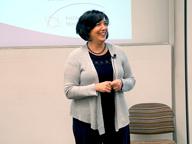Faculty News
—
NYU Global Research Prof. Ian Bremmer reacts to Secretary of Defense Chuck Hagel's resignation
—

Excerpt from Business Insider -- "'Once the secretary of defense post became primarily about policy (as opposed to managing the bureaucracy and keeping the budget under control), Hagel was a challenge for the Obama administration,' Bremmer wrote in an email. 'It's true that he wasn't a good fit for that job, but he also wasn't given a chance — they needed clear policy alignment, and pushed him out.'"
Faculty News
—

Excerpt from Business Insider -- "'Once the secretary of defense post became primarily about policy (as opposed to managing the bureaucracy and keeping the budget under control), Hagel was a challenge for the Obama administration,' Bremmer wrote in an email. 'It's true that he wasn't a good fit for that job, but he also wasn't given a chance — they needed clear policy alignment, and pushed him out.'"



















